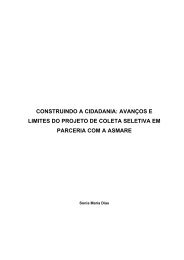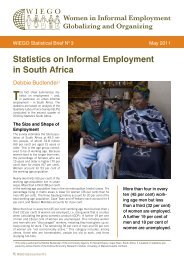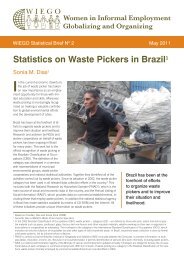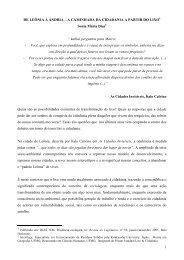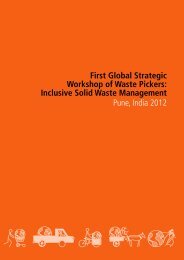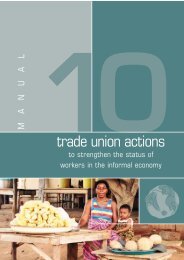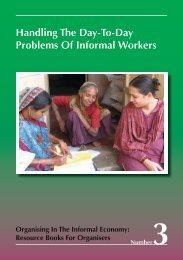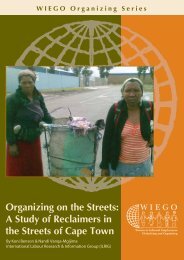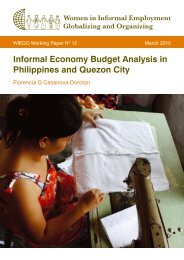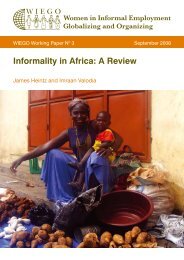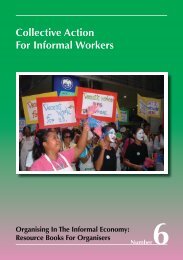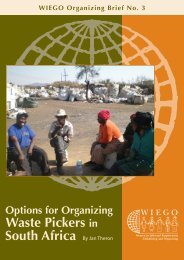<strong>WIEGO</strong> Technical Brief (Urban Policies) N o 7The second phase of the assignment comprised the preparation of this report based on the stakeholders’opinions, gathered from the process described above, related <strong>to</strong> the feasibility of waste picker MBOs accessingcarbon finance.The issues <strong>and</strong> discussion points presented in this paper are organized according <strong>to</strong> four inter-relatedthemes that arose during research. Readers should take these themes in<strong>to</strong> consideration when assessingwhether carbon finance is feasible <strong>and</strong> realistic for MBOs of informal waste pickers:• Requirements, methodology <strong>and</strong> MBO capacity• Commercial viability• Ethical considerations• Other funding options <strong>and</strong> solutionsAt different points, ideas are presented regarding the investments that waste picker MBOs may need <strong>to</strong>make in order <strong>to</strong> meet the requirements of developing <strong>and</strong> managing a carbon offset project. A number ofrecommendations for consideration as next steps are also presented.<strong>Issues</strong> <strong>to</strong> <strong>Consider</strong>An observation among key informants is that some waste picker MBOs, in the absence of guidance or information,are interested in entering the carbon market <strong>and</strong> earning income from the sale of carbon credits,in order <strong>to</strong> improve their personal <strong>and</strong> collective circumstances. This opinion often changes once they areinformed about the administrative <strong>and</strong> technical requirements, the costs, the risks, <strong>and</strong> the potential ethicalissues associated with this funding source.Requirements, Methodology, <strong>and</strong> MBO CapacityThe process <strong>and</strong> requirements that waste picker MBOs would need <strong>to</strong> follow in developing a carbonoffset project are detailed in the “background document” prepared in the first phase of this assignment,<strong>and</strong> reproduced in Appendix 1 of this report. As the research behind the preparation of the “backgrounddocument” found, <strong>and</strong> as some stakeholders were already aware, the process of designing a carbon offsetproject <strong>and</strong> preparing a Project Design Document (PDD) under both CDM <strong>and</strong> voluntary markets 2 is highlytechnical <strong>and</strong> complex.MBOs of informal workers, including waste picker organizations, are diverse, at different stages of development,<strong>and</strong> have different abilities <strong>and</strong> capacity-building needs. Some are complex organizations withlarge memberships <strong>and</strong> multiple enterprises that can include banking facilities, online shopping, insuranceschemes, retail shops, <strong>and</strong>/or the implementation of projects with funding from multiple donors, all requiringsophisticated management <strong>and</strong> accounting systems. Some also successfully negotiate <strong>and</strong> managecontracts with municipal authorities <strong>to</strong> provide waste management services. Others are characterized by alack of skills in leadership <strong>and</strong> basic management <strong>and</strong> administration, with a wide array of ongoing training,development, <strong>and</strong> infrastructure needs (Achtell 2012).Despite the sophistication of some MBOs, it would appear that none of those with which the intervieweesare associated could tackle the requirements for developing a carbon offset project <strong>and</strong> preparing a PDD,using in-house expertise only. Interviewees were consistent on this point. For example, one noted that itwas “not realistic” that informal waste picker MBOs could follow the requirements, which another describedas “extremely onerous.”2While some interviewees suggested that the development of a small-scale project under voluntary market guidelines may mean lower transaction costs<strong>and</strong> less bureaucracy than the CDM, one expert has noted that, “voluntary markets offer no short cuts for the informal sec<strong>to</strong>r” (Chintan 2009: 24).3
<strong>WIEGO</strong> Technical Brief (Urban Policies) N o 7As the research found, carbon offset projects are usually developed by large companies with significantcorporate technical, legal <strong>and</strong> project-management capacity, or the resources <strong>to</strong> hire expert consultants,<strong>and</strong> <strong>to</strong> absorb the associated risks. <strong>Waste</strong> picker MBOs would have <strong>to</strong> contract consulting firms <strong>to</strong> develop<strong>and</strong>, potentially, <strong>to</strong> manage their carbon offset projects. Leaving aside ongoing management <strong>and</strong> moni<strong>to</strong>ringcosts, some interviewees noted that the cost of hiring a specialized company <strong>to</strong> develop a PDD could be US$50,000, <strong>and</strong> developing a PDD <strong>and</strong> taking a project through the registration process could cost from US$100,000 <strong>to</strong> US $250,000, or more, with a project development time frame of one <strong>to</strong> two, or more, years. 3According <strong>to</strong> one respondent, waste picker MBOs in Brazil could probably engage with the requirements<strong>and</strong> would possibly have government support in the form of resources <strong>to</strong> hire technical experts. Otherwise,it would appear that none of the MBOs with which the interviewees are associated could make financialcommitments on this scale using solely their own resources. Therefore, for most it would be necessary <strong>to</strong>first invest in developing proposals or business plans demonstrating the financial viability of the project. Itwould also be necessary <strong>to</strong> invest in research <strong>and</strong> building relations with financial backers <strong>to</strong> whom theseproposals or business plans could be presented. These might include donor agencies, venture capitalists,banks or “carbon aggrega<strong>to</strong>rs” that would cover project development <strong>and</strong> registration costs, possibly agree<strong>to</strong> purchase the carbon credits at a fixed price, <strong>and</strong> identify an eventual buyer.Besides waste picker MBO capacity <strong>and</strong> feasibility issues related <strong>to</strong> project development, there are also capacityissues related <strong>to</strong> the methodology. As indicated in the “background document,” a key aspect related<strong>to</strong> carbon offset projects is the use of approved methodology in design <strong>and</strong> moni<strong>to</strong>ring. The most relevantexisting methodology is probably “AMS-III.AJ. Recovery <strong>and</strong> recycling of materials from solid wastes.” Asnoted by a key informant involved in the early stages of methodology development, the initial objective was<strong>to</strong> create another income stream that could be derived from municipal solid waste, in addition <strong>to</strong> previouslyapproved methodologies related <strong>to</strong> the capture of l<strong>and</strong>fill gas (LFG) <strong>and</strong> “methane avoidance projects suchas aerobic composting <strong>and</strong> incineration,” 4 (Peterson <strong>and</strong> Godin 2009: 2) <strong>and</strong> not necessarily or primarily <strong>to</strong>meet the needs of informal waste pickers.The initial idea was that the methodology would “promote higher recovery rates for recyclables throughupgrading of the materials offered for sale,” <strong>and</strong> improve the working conditions for those that recovermaterials from the waste stream. (Peterson <strong>and</strong> Godin 2009: 2).Furthermore, as a st<strong>and</strong>-alone project, the proposed project for the recycling of HDPE <strong>and</strong> LDPEis very small as a CDM activity. Even with the anticipated, eventual (addition) of other recyclablematerial the project will generate only small level(s) of greenhouse gas emissions. Nonetheless,the development of the proposed methodology for the recovery of secondary material frompostconsumer discards is deemed a worthwhile undertaking as registered projects will generateadditional revenue for waste pickers who as a group survive on very low incomes.Peterson <strong>and</strong> Godin (2009:10)The methodology is not clear about how, precisely, a carbon offset project would generate additionalrevenue for waste pickers, unless they were not already in the business of selling recovered plastic, whichis the case for few waste picker organizations. Also, it seems that the carbon offsets generated from usingrecycled, instead of virgin, materials <strong>to</strong> manufacture new products would accrue <strong>to</strong> the manufacturing facility,not <strong>to</strong> the waste pickers, unless the manufacturer agreed <strong>to</strong> give the carbon credits <strong>to</strong> the waste pickers.As noted in the methodology, one condition is that there must be a contractual agreement between therecycling facility (i.e. potentially waste pickers) <strong>and</strong> the manufacturing facility, guaranteeing that only one ofthem claims the carbon credits. This, of course, would require investments in legal advice. 53One key informant with direct experience of the process noted that, besides resources <strong>and</strong> risk <strong>to</strong>lerance, <strong>to</strong> develop a carbon offset project you “needa lot of patience.” Another key informant expressed concern about how long it would take for government authorities <strong>to</strong> approve a proposed carbonoffset project.4It was also seen as important <strong>to</strong> increase recycling because of the contribution of municipal solid waste <strong>to</strong> greenhouse gas (GHG) emissions.5Entering in<strong>to</strong> contracts would probably also require formalization of the MBO, which may be a challenge for some. Formalization would probably alsobe a requirement when applying for donor funding <strong>to</strong> develop a PDD.4



